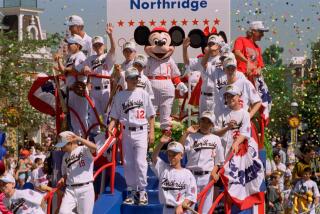Game of Baseball Is All Greek to Them
- Share via
ATHENS — Greeks are learning a new meaning for Homer.
The host country of the 2004 Olympics is trying to put together a baseball team for the games, but the sport isn’t exactly well-known here. The only baseball diamonds in Athens are two weed-clogged sandlots at a former U.S. military base.
So, to get help in organizing and recruiting a team, Greece has turned to major league baseball and Peter Angelos, the Greek American owner of the Baltimore Orioles.
“Most Greeks with whom I’ve talked say, ‘Baseball--we can’t figure out what’s going on,’ ” said the U.S. ambassador to Greece, Nicholas Burns. “If I were a Greek and heard about baseball for the first time, I think I’d be confused by it.”
Burns has taken on the additional assignment of baseball ambassador to coordinate efforts to build a team from the dugouts up. Help has come from several American organizations, including major league baseball’s international division.
“To start a team without any history of the game here would have been impossible,” Burns said.
Major league baseball plans to send a full-time coach and administrator in the next year to work with Greeks, said Jim Small, vice president of international market development.
But coaches need a place to coach.
The Hellenic Baseball Federation is renovating the diamonds on the former Hellinikon military base for practice. Olympic organizers say the 2004 baseball and softball venues will be on the site of the international airport, which is to be closed in 2001 after a new airport opens. In addition, two fields in other parts of the country will be built, Small said.
As host for the Olympics, the country that gave the world Homer, Plato and Socrates automatically qualifies to compete in every sport in 2004.
The task of recruiting and training a Greek baseball team has been undertaken by Angelos. Support has also been pledged by the Boston Red Sox.
Potential players must have some Greek ancestry, which would include more than 700,000 families in the United States and Canada. Scouts also will look for talent in places such as Australia.
“I think it’s a great advantage for Greece to have this diaspora,” Burns said.
Some Americans of Greek descent are already making their pitch. Chuck Samiotes, a 44-year-old civil engineer from Wayland, Mass., said just one at-bat in the Olympics would be “heaven.”
But one potentially troubling issue is whether the new Greek citizen-athletes would be required to go through the nation’s mandatory military service.
Samiotes already has tried to introduce baseball to Greeks, namely his nieces and nephews, during a visit in 1997.
“We got yiayia’s magoura (“grandma’s cane”) and a tennis ball and started playing in the field behind the house,” he said.
When he came back a year later, he brought nine balls, bats and gloves and began teaching them the game in an Athens suburb.
“The enthusiasm on the kids’ faces--we knew that we could bring baseball to Greece,” he said.
The Greek baseball effort has inspired comparisons to the Jamaican bobsledders from the 1988 Winter Olympics. Samiotes takes offense.
“That team was developed just for four guys to go and have a good week at the Olympics,” he said.
Samiotes said this baseball odyssey is a lifelong commitment.
“It’s not, ‘an Olympics and see you later,’ ” he said. “I would love to be able to teach baseball to children after the Olympics.”
So would the Hellenic Amateur Baseball Federation and major league baseball.
“It would be a tremendously wasted opportunity if we just focused on putting a team on the field in 2004,” Small said. “We’re going to send college instructors next summer . . . to spend five or six weeks in Greece going from school to school and from club to club teaching baseball.”
Some local baseball groups have sprouted around Greece hoping the sport will have the same type of success as basketball, which went from unknown in the 1960s to wildly popular.
Europeans are not completely unfamiliar with baseball. American servicemen introduced the sport, which took root in some enclaves in Germany, Italy and elsewhere.
The general manager of the 2004 organizing committee, Costas Bakouris, became a Chicago White Sox fan while studying at DePaul University. But he believes it might be very difficult for Greeks, accustomed to fast-paced soccer and basketball, to appreciate baseball’s slow pace and its many nuances.
Burns, however, sees a time when talk of strikes will not just mean labor unrest to Greeks.
“Siga, siga [“slowly, slowly”],” he said. “This does not happen overnight. It happens over a generation.”
More to Read
Go beyond the scoreboard
Get the latest on L.A.'s teams in the daily Sports Report newsletter.
You may occasionally receive promotional content from the Los Angeles Times.






